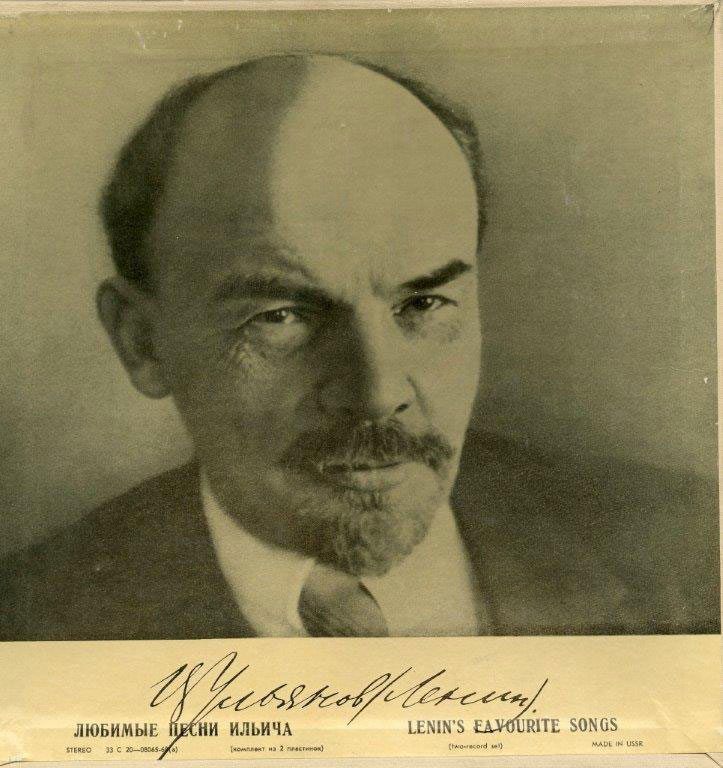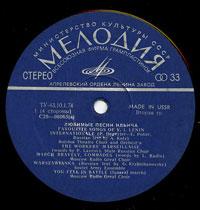
The father of the Russian Revolution was reportedly a big music lover. Along with songs of revolution and struggle, Vladimir Ilyich Lenin was said to be a fan of Russian folk songs, Tchaikovsky, Schubert, Mussorgsky, and Dargomyzhsky. To celebrate this, Melodiya, the state-owned record company of the Soviet Union, reissued the LP box set Lenin's Favourite Songs in 1978.
I picked up this two-record set at a now long-gone Russian book and record shop near the Flatiron Building in the early 1980s. In fact, I was so taken with the juxtaposition of the scowling Lenin portrait and the implied cheerfulness of the album title that I bought a dozen, every copy they had in stock, to give to friends for holiday presents that year. Listen here to an excerpt from the heroic March Bravely Comrades sung by the Moscow Radio Choir.
It should come as no surprise that number one on Lenin's top-ten list is The Internationale. After all, the composition by Pierre De Geyter, has been a popular standard on the left cultural circuit, in one form or fashion, since the late 19th Century when the Second International adopted the song as its anthem. The revised Soviet version was made the country's official national anthem in 1944 under Stalin, and ctivist rocker Billy Bragg released his own updated version in 1990. Here is an excerpt of The Internationale performed by the Bolshoi Theatre Choir and Orchestra.
Following suit on side one of this revolutionary vinyl is The Workers' Marseillaise, done a capella by the State Russian Choir; March Bravely, Comrades performed by the Moscow Radio Choir; Warszawianka in a rendition delivered by the Soviet Army Ensemble; and You Fell in Battle by the Moscow Radio Choir. Other Soviet chart-busters include the choir doing Rage, Tyrants and Tormented by Hardships of Prison performed here, in part, by a very religious sounding Moscow Radio Choir.
The album's liner notes are by prominent Soviet theater critic Simon Davidovich Dreiden (1905-1991). He writes that as early as 1902, Lenin pushed for the publication of Songs of the Revolution, a collection issued by Iskra, the official organ of the Russian Social Democratic Labor Party. Dreiden includes recollections of Lenin's friends about the founder of the Soviet state singing with fervor and gusto. Among them, fellow revolutionary Maria Moiseyevna Essen wrote:
"I recall the evenings we spent in Lenin's flat. Vladimir Ilyich had a rather pleasant, somewhat husky voice and he greatly loved to sing in chorus or just listen to songs sung by others. Our repertory was quite diverse. We usually began the evening with singing 'L'Internationale,' 'Marseillaise,' 'Warszawianka,' etc. We used to sing, 'Tormented By the Hardships of Prison' and 'On the Old Barrow in the Wide Steppe' with great feeling. Ilyich also liked songs of Siberia very much..."
Dreiden writes that Lenin "loved songs to the last day of his life." He quotes from Lenin's wife, Nadezhda Krupskaya's account of the Soviet leader's last days in Gorki in 1923: "Vladimir Ilyich joked, laughed and at times hummed L'Internationale, Red Banner and In the Valley of Daghestan."
What tune is Vladimir Putin humming these days? The Russian leader says he loves Russian music but so far has provided few details. He is on record as having delivered a passable Blueberry Hill.
Who knows, as a follow-up to the Olympics at Sochi we may just see the release of Putin's Playlist on iTunes. Then we can see if the two Vlads have more in common than we would have guessed.

